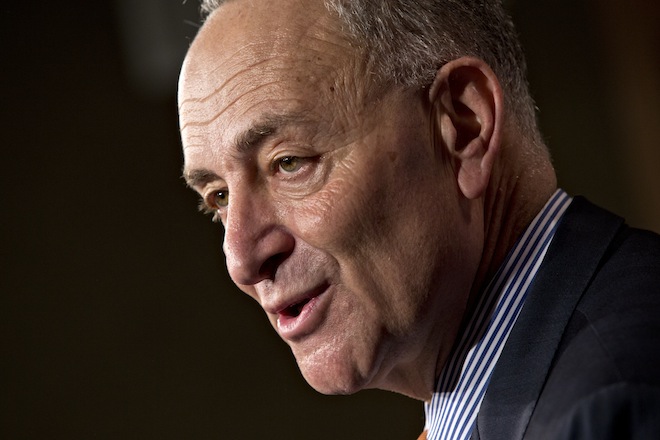Now that the Senate’s immigration bill is on a glide path to passage, I want to take a minute to draw out the connection I drew between House Republicans’ inability to pass a farm bill and immigration reform in greater detail. And I think the best place to start is with a mild disagreement between Chuck Schumer and the duo of Harry Reid and Dick Durbin over whether it was worthwhile to concede enough to the GOP to garner 70-ish votes for the Senate bill.
For the uninitiated, Reid and Durbin were concerned that conceding policy for bonus votes only served to start negotiations with the House farther to the right than necessary.
In a world with a functioning House majority that could pass a real, but conservative immigration reform bill, that’s a sensible concern. Schumer’s key insight, though, was that we do not inhabit such a world. And if John Boehner can’t pass a House position, then the only hope for immigration reform is for him to feel overwhelming pressure to put the Senate bill on the floor and let Democrats carry it. Thus the 70-vote goal.
The dispute probably wouldn’t have happened if anyone in either party had any idea what Boehner wants to or can do on immigration. But it’s been a guessing game since day one, and Schumer and Reid found themselves on opposite sides of a strategic fence. The farm bill vote suggests Schumer’s instincts were correct.
There’s no causal or substantive connection between the farm bill failure and the House GOP’s ability or lack thereof to pass an immigration reform bill. It just underscored, in dramatic fashion, that John Boehner can’t pass almost anything substantial in the House that also enjoys the support of a majority of his conference. Once he commits to securing 120-or-so Republican votes, he’s committed to making legislation too conservative for Democrats, which means he actually needs 218 Republicans, and there just aren’t many substantive issues that 218 Republicans agree on.
When you apply that logic to immigration reform, the first question is, are there 120-or-so House Republicans who support a path to citizenship. I don’t think there are. So that has to go. Once that goes, though, Boehner probably loses most or all Democrats. So now he needs 218 Republicans to agree on what’s left, or else he has to start cutting more provisions out of the bill and adding new draconian measures to it.
I’m not certain of this, but I don’t think it’s doable. First, it’s hard to imagine 218 Republicans getting to yes on any major legislation. And even if they can agree on some policy in theory, hardliners will recognize the effort as a feint to get to conference where conservatives will be quickly sold out, and withhold support for that reason. Even if that doesn’t doom the thing, I think it’s possible that the final legislation would be toxic enough to damage the party and that Boehner would be reluctant to put it on the floor.
If he somehow pulls it off, then, yes, Durbin and Reid’s concerns will be vindicated.
But if the GOP position on immigration reform goes the same way as the farm bill, Boehner will have to either get out of the way of the Senate bill or just do nothing, and compound the party’s growing problem with Hispanic voters.
It’s easy to imagine him doing nothing if the bill in question had passed the Senate with all Democrats and six or seven RINOs. And he may do nothing anyhow. But he’ll have a lot more cover if 15 or 20 Senate Republicans have vouched for it.






